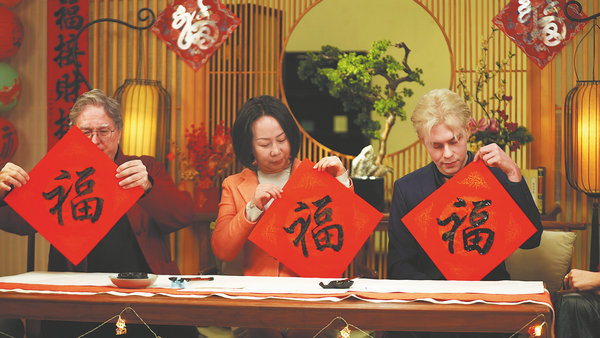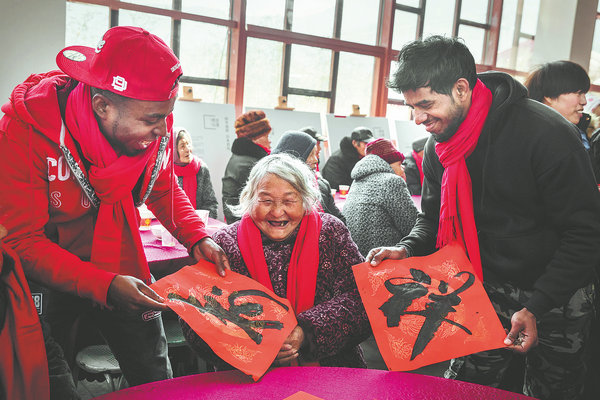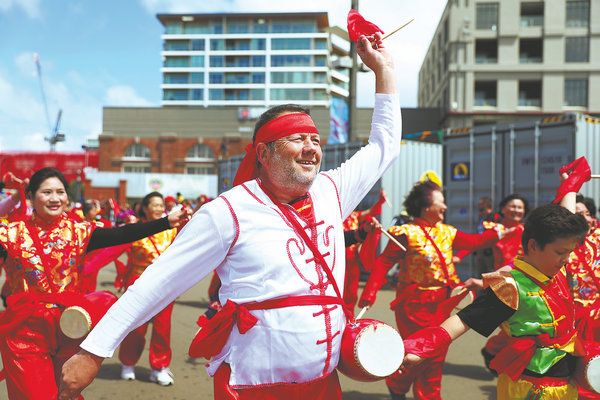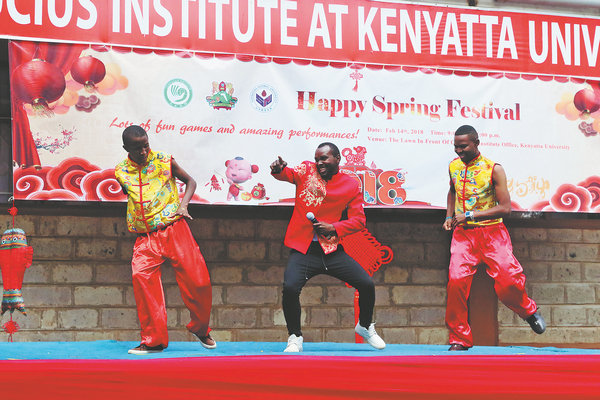

Spring Festival's UNESCO recognition maps its position as a planetary jamboree that comes from China but now formally belongs to our shared world, Erik Nilsson reports.

Participants in a salon on Spring Festival's global legacy — (from left) David Moser, associate professor at Beijing's Capital Normal University, Wen Chunying, Communication University of China's dean of the School of International Studies, and Kirill Kravtsov, a postgraduate student from the School of Journalism and Communication at Peking University — write the character fu, which is often used to express auspicious wishes for the new year. [Photo provided to China Daily]
It's official: China's Spring Festival belongs to the world. The country and planet are poised to welcome the Year of the Snake, weeks after UNESCO inscribed "Spring Festival, social practices of the Chinese people in celebration of their traditional new year", on the Representative List of the Intangible Cultural Heritage of Humanity.
"It's not just about Chinese people. It's for everyone," says Communication University of China's dean of the School of International Studies Wen Chunying.
"It's not just in China. It's all over the world. We celebrate the coming of the new year with people all over the world. We celebrate a new beginning and embrace the joy of life and sharing fun."
The professor and Fulbright scholar recently joined an Embracing Cultures salon organized by China Daily. She explored Spring Festival's meaning in today's world with US citizen David Moser, associate professor at Beijing's Capital Normal University; Russian Kirill Kravtsov, a postgraduate student from the School of Journalism and Communication at Peking University in Beijing; and two China Daily co-hosts.
Transforming traditions
They examined the past, present and future of the festival as it has continued to unfold across four millennia, and as technology and globalization are accelerating its evolution.
Participants traced its roots from a mostly agricultural local jubilee to a universal global celebration. They considered how such distinctive Chinese features as crackling fireworks, omnipresent red and dumpling dinners are embedded within such human universals as annual homecomings, family reunions and festive feasts.
For example, innovation and internationalization mean more of the hongbao (red envelopes containing cash) that elders have given youth for centuries today take the form of digital packets sent as mobile payments on social media platforms like WeChat. And e-commerce is transforming the ways people shop for the reunion banquets that are arguably the highlights of the festival. For instance, online shopping means more dishes and drinks from other parts of the country and world are appearing on tabletops during the celebration. Think mutton from northern China's Inner Mongolia washed down with French wine alongside local delicacies in the home of a family from southern China's Fujian province, all ordered from Taobao and Meituan.
People used to have to travel and spend perhaps days visiting and perusing markets, especially in rural areas, to put together more basic spreads, Kravtsov points out.
"That could be very, very complicated," he says. "But now, you can just open your phone and buy something online. That's very convenient."
Wen recalls that as a student she would have to make expensive long-distance phone calls to family and friends if she couldn't get home for the festival.
"But now, I can just fire up a WeChat video call and have a 'cloud reunion' on my phone. And no more paper cards, either. We make very personalized video messages to share our blessings. That's a really cool thing."
Moser says he usually visits his in-laws in Hebei province but will instead talk with them via video call this year, when he joins his wife, who's working in Bangkok over the holiday.
"We will have a WeChat call where we're all looking at each other and everyone is talking. So, we can kind of be together in a virtual space, even though we can't be in actual space. So, that's good," Moser says.
"The core values are the same, and it's a way of continuing. It's a way of doing the same thing but with new tools," he says.
"Sometimes, there's good, and there's bad. With technology comes greater access. But then, you lose something."

A volunteer gives a calligraphy featuring the character for longevity to an elder at a gathering to celebrate the Spring Festival in Xiantan village in Huzhou, Zhejiang province. [Photo by Gao Chengjun/For China Daily]
Grand gala
He points to the CCTV Spring Festival gala, which he appeared on in 1999, when it was one of the most viewed televised events in the country and the world.
"For a long time, this was a kind of family tradition, that everyone watched at the same time. It was the talk of the town the next day, and everyone sort of compared it to the last year, and it was like a ritual that united everyone," Moser says.
"Nowadays, some people don't even have a television. They're looking at their phone, and they're watching several different chunjie wanhui (Spring Festival galas) at different times, and they watch them later on, and stuff like that.
"So, you sort of get more variety and maybe greater quality and more interest, but you also lose this kind of unity. It's good and bad. You lose some things, but you gain some very valuable things."
Moser, who moved to China in 1986, says appearing in the gala was a "very special event" in his life.
"For Chinese people, it's also not just cohesive and unifying for the country, but everyone is aware that the Chinese people overseas are also watching it — maybe not at the same time, but they end up watching it. So, it's like uniting Chinese culture all across the world, which I think is very important."
For the 1999 edition, he joined three other non-Chinese for a performance of xiangsheng, or "cross-talk", a Chinese comedy genre involving humorous conversations.
"It was the Year of the Rabbit. So, I really loved that during rehearsals they had these little children dressed in rabbit costumes, and they were always running around. I thought — these cute little kids dressed in rabbit suits — it was just so sweet," Moser recalls.
"I'd seen the Spring Festival gala many years on the television, but it was my first time to actually participate in it. I was amazed at all the effort that goes into it — many months of preparation and many, many rehearsals and changes. The timing has to be exactly the same for each performance because it's done live, so you need to have each performance timed down to the second," he explains.
Another challenge is that every part needs to appeal to every viewership in China, he says.
"Young kids, the grandmas, the parents, the young teenagers — you need to have something in the show that has something for everyone," he says.
"It was probably one of the most exhausting experiences in my life but also one of the most, sort of, gratifying," Moser says.
"It was very scary to be standing there performing the skit on TV knowing that as many as 800 million people were going to be seeing us on the stage. That's pretty terrifying. But luckily, we'd memorized our lines so well that we could read them in our sleep. It was a really, really amazing experience and so much fun."

A man performs Ansai waist drumming, a dance and drumming style from Shaanxi province, during a temple fair parade in Wellington, New Zealand. [Photo by Zhang Jianyong and chinaculture.org/For China Daily]
Family feast
While it was the most amazing Spring Festival for Moser, that year he missed out on his — and the other participants' — favorite custom: the Chinese New Year's Eve reunion banquet. Everyone involved in the production had to eat basic boxed meals in the studio on the night when people traditionally gorge themselves on the finest food of the year with their families.
Usually, he and his wife visit her hometown for the big meal.
"The food is so great. I gain like five pounds every time," he says, laughing.
"I think one of the reasons I fell in love with this culture is the food. Most other countries do have their local foods — they have their traditional foods — but I don't think anything can match China in terms of the variety and the amazing creativity that goes into food."
The meal is a centerpiece of the reunions that compel the planet's largest annual human migration.
"No other country moves hundreds of millions of people back home to see family (every year)," Moser says.
He points out it's difficult for so many people to travel, and especially to book train tickets, during this period. But people do whatever it takes.
"You've got to go home," he says.

A singer performs a Chinese song during Spring Festival celebrations in Nairobi, Kenya. [Photo by Liu Hongjie/China Daily]
Party planet
Kravtsov says he looks forward to experiencing his first Spring Festival in China in Beijing, or perhaps in an even more rural setting.
"It's about harvest, it's about the agricultural calendar, and it's about our links to nature. So, I think we should go to a smaller city," he says.
He recalls first experiencing the celebration in Russia in 2020, when his university in St. Petersburg organized events for Chinese students.
"It was the first time I got to know a lot of Chinese friends, and it was the first time I got to know Chinese culture and traditions in a more open way. We did not know much about China and about Chinese culture (before)," Kravtsov says. "It was one of the most astonishing experiences for me."
Wen says there's even more to celebrate this year, as the Chinese festival goes global — in a now-official capacity.
"Spring Festival fosters an exchange of ideas and traditions across countries and among civilizations. So, wherever you are and whoever you are, you can just join in the parade and enjoy the delicious food, and even learn about Chinese crafts," Wen says.
"It's kind of not just about celebrating. It's more like learning from each other and growing together."

